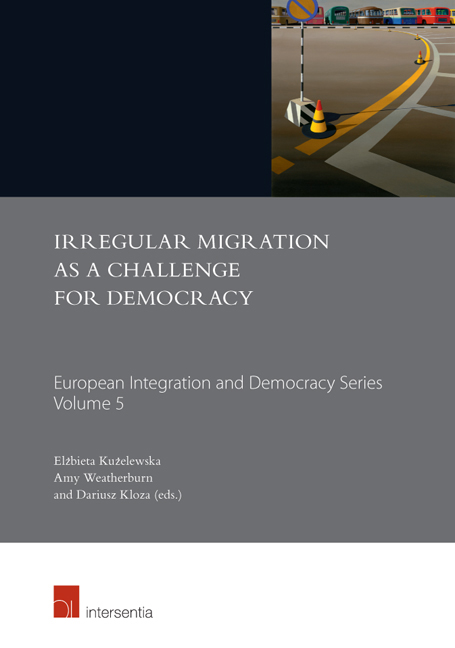Book contents
- Frontmatter
- Foreword
- Introduction
- Contents
- List of Abbreviations
- PART I The European Integration Project And Irregular Migration: Upholding Fundamental Values And Principles
- 1 The ‘Migrant Crisis’: Member States’ or EU's Responsibility?
- 2 Solidarity in EU Asylum and Migration Law: A Crisis Management Tool or a Structural Principle?
- 3 EU Foreign Policy and Other EU External Relations in Times of Crisis: Forcing the Law to Overlap?
- 4 The Migration Crisis in Europe: The Implications for Trade and Labour in a Globalised Context
- 5 Has the Migration Crisis Challenged the Concept of the Protection of the Human Rights of Migrants? The Case of Ilias and Ahmed v. Hungary (Invited Contribution)
- 6 European Responses to the Mediterranean ‘Refugee Crisis’ and the Fear of Saving Lives (Invited Contribution)
- Part II Migrants, their Rights and the Limits Thereof
- Part III The Status Quo of Migration in Europe: Selected National Perspectives
2 - Solidarity in EU Asylum and Migration Law: A Crisis Management Tool or a Structural Principle?
from PART I - The European Integration Project And Irregular Migration: Upholding Fundamental Values And Principles
Published online by Cambridge University Press: 12 October 2018
- Frontmatter
- Foreword
- Introduction
- Contents
- List of Abbreviations
- PART I The European Integration Project And Irregular Migration: Upholding Fundamental Values And Principles
- 1 The ‘Migrant Crisis’: Member States’ or EU's Responsibility?
- 2 Solidarity in EU Asylum and Migration Law: A Crisis Management Tool or a Structural Principle?
- 3 EU Foreign Policy and Other EU External Relations in Times of Crisis: Forcing the Law to Overlap?
- 4 The Migration Crisis in Europe: The Implications for Trade and Labour in a Globalised Context
- 5 Has the Migration Crisis Challenged the Concept of the Protection of the Human Rights of Migrants? The Case of Ilias and Ahmed v. Hungary (Invited Contribution)
- 6 European Responses to the Mediterranean ‘Refugee Crisis’ and the Fear of Saving Lives (Invited Contribution)
- Part II Migrants, their Rights and the Limits Thereof
- Part III The Status Quo of Migration in Europe: Selected National Perspectives
Summary
INTRODUCTION
In recent years, the European Union (EU) has arguably been experiencing the deepest crisis in its history. The most acute phase of the economic and sovereign debt crisis had just been overcome, when a new crisis, driven by the increased fiow of migrants and asylum seekers from the Southern and Eastern Mediterranean coasts, exposed the weaknesses of the European asylum system and led to an unprecedented level of confrontation between the Member States.
The two crises are not only interconnected, but also share some common features and raise similar concerns.
The crisis of sovereign debt and the ensuing threat to the common currency have revealed the deep fiaws existing in the architecture of the Economic and Monetary Union (EMU) and led to mounting dissatisfaction with EU policies among European citizens. In some Member States, the EU is viewed as responsible for detested austerity, shrinking budgets and ultimately the demise of the welfare state, whilst in others financial solidarity is fiercely contested as an unacceptable challenge to the principle of democracy.
Looking at the migration crisis and its perception in public opinion offers an equally depressing picture. The crisis has exposed a failure in the governance of migration and generated a widespread sense of insecurity, prompting calls for border closure and repatriation of powers. The EU ' s intervention has been perceived as ineffective in the control of the external borders and in aiding the Member States in the allocation and reception of asylum seekers.
Both the sovereign debt crisis and the migration crisis can be explained as the product of a ‘perfect storm’, a combination of external events, incorrect behaviours and ill-designed legal rules. The reason why they are so concerning, however, is that they also question some of the foundational values that are supposed to be shared within the Union, solidarity in the first place.
Against this background, the present chapter aims to assess the role of the principle of solidarity in the context of EU migration and asylum policies.
At the outset, by briefiy sketching the evolution of references to solidarity in the EU Treaties, it shows that solidarity has emerged as a legal principle capable of imposing obligations (section 2).
- Type
- Chapter
- Information
- Irregular Migration as a Challenge for Democracy , pp. 23 - 50Publisher: IntersentiaPrint publication year: 2018
- 3
- Cited by



